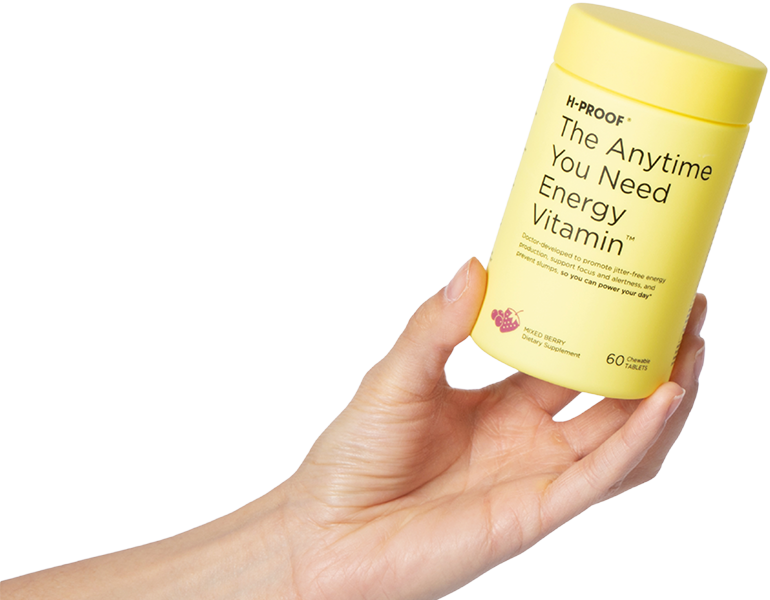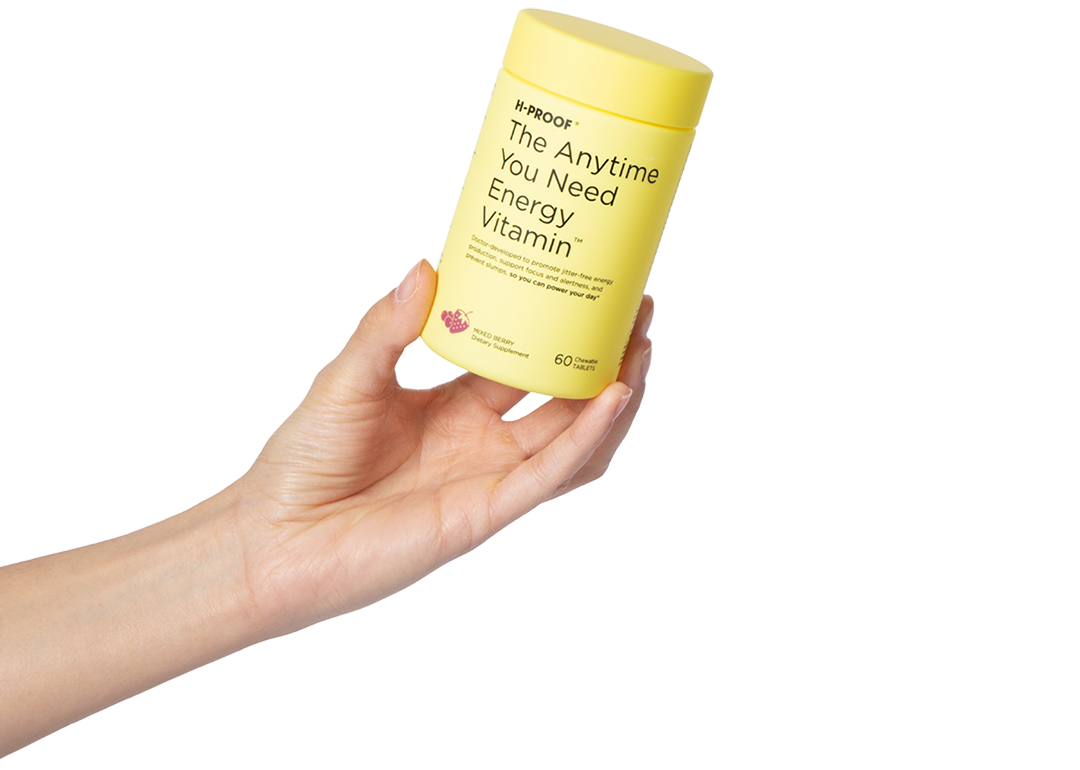You start your day with a cup of coffee and feel sharp, focused, and alert—until, a few hours later, your energy drops, concentration fades, and irritability sets in. This pattern is commonly referred to as a caffeine crash.
While coffee is one of the most widely consumed stimulants in the world, its benefits can quickly give way to fatigue if it’s not consumed strategically. As a physician, I often see patients experience energy fluctuations. In this article, I’ll explain the biological reasons behind caffeine crashes—and, more importantly, what you can do to help prevent them.
Why Do Coffee Crashes Happen?
To understand a caffeine crash, we first need to understand how caffeine works. And the key to understanding how caffeine works is adenosine.
Adenosine is a neuromodulator, meaning it helps regulate the activity of neurons in the brain. It builds up gradually in your brain throughout the day as a byproduct of cellular energy use—specifically, the breakdown of adenosine triphosphate (ATP), the molecule your cells use for energy.1
The more energy your brain uses, the more ATP is broken down and the more adenosine accumulates. And when adenosine binds to its receptors in the brain, it sends a powerful signal to the body that it’s time to rest.2
Caffeine binds to the same receptors, blocking adenosine from binding. In doing so, caffeine essentially “masks” fatigue—giving you a temporary feeling of alertness and focus.3
The problem? Caffeine doesn’t eliminate adenosine—it just delays the message. Once the caffeine wears off, all that accumulated adenosine floods back, triggering sudden fatigue, brain fog, and even mood swings. These are common effects caffeine can have when it's not timed or dosed properly.3
Several lifestyle factors can make this crash worse:
- Poor sleep the night before increases baseline fatigue.
- Dehydration intensifies sluggishness and headaches.
- Sugary add-ins like flavored syrups or sweetened creamers can cause blood sugar spikes followed by rapid drops.
- Large single servings of caffeine (e.g., a 20 oz. cold brew) flood your system all at once instead of providing a gradual energy boost.
Fortunately, you don’t have to give up coffee to avoid the crash. You just need to approach it smarter.

How to Not Crash from Coffee: 7 Strategies
1. Spread Out Your Caffeine Intake
Instead of downing a giant mug of coffee first thing in the morning, try sipping smaller amounts throughout the day. This slows the absorption curve and helps you maintain steady focus without overstimulating your system or setting yourself up for withdrawal symptoms later.
If you find yourself reaching for a second or third cup, consider afternoon coffee substitutes that offer sustained energy without overstimulation.
2. Prioritize Quality Sleep
Caffeine is no substitute for sleep. Adults need 7–9 hours of quality rest per night to support mental clarity, hormone regulation, and natural energy rhythms. If you're still feeling sleepy even after a morning coffee, it's often a sign your body is asking for rest, not just more stimulation.
3. Stay Hydrated
Caffeine is a mild diuretic, which means it increases urine production and can contribute to dehydration if you’re not drinking enough fluids. Even mild dehydration can cause fatigue, dizziness, and headaches—symptoms that feel a lot like a caffeine crash.4
A good rule of thumb: Drink a glass of water with every cup of coffee.
Bonus: Staying hydrated also helps your body metabolize caffeine more efficiently.
4. Eat Before or With Coffee
Drinking coffee on an empty stomach can spike cortisol levels, irritate your stomach lining, and lead to blood sugar fluctuations that amplify the crash later.5
A balanced breakfast with protein, healthy fats, and complex carbs helps regulate blood sugar and supports stable energy.
5. Maintain a Whole-Food, Balanced Diet
Your body runs on more than just caffeine. Nutrient-rich foods like leafy greens, legumes, eggs, fish, and whole grains provide steady energy throughout the day. Key nutrients like B vitamins, iron, magnesium, and antioxidants support cellular metabolism and help the body process caffeine efficiently.
A diet rich in whole foods prevents the energy dips that caffeine alone can’t fix.


The Anytime You Need Energy Vitamin®
A science-backed chewable that delivers jitter-free energy, sharpens focus and alertness, and stops slumps so you can power your day.*
Shop The Anytime You Need Energy Vitamin®6. Consider Lower-Caffeine or Alternative Options
If you’re sensitive to caffeine or prone to crashes, switching to a gentler source might help. Tea or matcha, for instance, contains L-theanine, an amino acid that promotes calm alertness and smooths the caffeine effect over several hours.
Mushroom coffee (which typically includes adaptogens like lion’s mane or cordyceps) offers a lower dose of caffeine and added support for mental clarity and stamina.
You can also explore energy alternatives, like H-PROOF’s Anytime You Need Energy Vitamin. These doctor-developed chewable energy tablets support ATP production (your body’s cellular energy source) using ingredients like B Vitamins and L-Tyrosine—without the jitters or crash of traditional caffeine sources.
7. Add Light Movement
Physical activity helps wake up the body and mind. Even a 10-minute walk boosts blood flow, enhances oxygen delivery to the brain, and stimulates endorphins—all of which can lift your energy levels without caffeine.
A quick stretch, some jumping jacks, or a stroll around the block can be surprisingly effective if you’re in an afternoon slump.
Additional Tips
- Avoid caffeine too close to bedtime. Caffeine has a half-life of 5 hours, meaning half the dose is still in your system long after consumption.6 For most people, cutting off caffeine by 3 p.m. is a safe bet to preserve good sleep quality.
- Stick to recommended limits. Most health experts agree that up to 400 mg of caffeine per day is safe for most adults.7 More than that can lead to dependence, anxiety, and irregular energy patterns.
- Take a short nap if needed. A 15–20 minute nap in the early afternoon can restore alertness and improve mood without disrupting your nighttime sleep. This is especially helpful if you’re experiencing a caffeine crash and have the flexibility to rest.

Boost Sustainable Energy with H-PROOF’s Anytime You Need Energy Vitamin
If you're looking for a smarter, crash-free way to power through your day, caffeine isn't your only option. Here at H-PROOF, we created the Anytime You Need Energy Vitamin to support your body’s natural energy production—without relying on high doses of stimulants.
Each chewable energy tablet contains a thoughtfully selected blend of B Vitamins (the building blocks of ATP), Calcium Pyruvate (connecting all phases of ATP production), and L-Tyrosine (a precursor to dopamine).
These ingredients work synergistically to support cellular energy, mental focus, and stamina—whether you’re powering through a work deadline, parenting a toddler, or recovering from a long flight.
No crash. No jitters. Just effective, science-backed energy when you need it.
This article is for informational purposes only and is not intended to be a substitute for professional medical advice.


